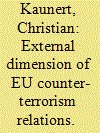|
|
|
Sort Order |
|
|
|
Items / Page
|
|
|
|
|
|
|
| Srl | Item |
| 1 |
ID:
094864


|
|
|
|
|
| Publication |
2010.
|
| Summary/Abstract |
Some very significant policy developments indicate "supranationalisation processes" of EU external relations in counter-terrorism, even in its most significant relationship with the USA. This means that, increasingly, the USA is willing to work with Europe through its institutionalised forum-the European Union. Thus, the EU achieves certain recognition on the world stage in areas previously completely unsuspected-the "high politics" of counter-terrorism. This supranationalisation process proceeds in two stages. Firstly, the construction of an Area of Freedom, Security and Justice (AFSJ) pools a significant amount of national sovereignty at the level of the EU through the establishment of internal EU competences. As a side effect, however, it also constructs an institutionalised structure for external actors, such as the U.S., to deal with. Through dealing within this institutional setting, member states' interests become defined in such a way that increasingly they construct a "European" interest related to counter-terrorism.
|
|
|
|
|
|
|
|
|
|
|
|
|
|
|
|
| 2 |
ID:
129578


|
|
|
|
|
| Publication |
2014.
|
| Summary/Abstract |
This article analyses the evolution of European Union (EU) police cooperation on the basis of structural processes in the form of agencification, regulation and standardization, as well as substantive processes in the form of information-sharing and multi-disciplinary cooperation. The Lisbon Treaty holds some key conditions for further integration. The level of integration of police cooperation in the EU is measured by analysing institutional power, the regulatory framework and transnational professionalism. Despite a positive score on each of these levels, member states remain caught between national sovereignty and solidarity. As a consequence, they face an implementation gap and have not embedded European police cooperation in their domestic systems. Building on the pro-integrative moves that have been introduced by virtue of the Lisbon Treaty, improved governance and deeper integration can be achieved by means of more active parliamentary involvement, independent police oversight (both at European and at the national level), the mainstreaming of cooperation mechanisms and a systematic Europe-wide cultivation of police professionalism. Within the realm of internal security cooperation in the EU, a concerted effort is required which demands close consultation between relevant institutional actors and the professional actors in the member states.
|
|
|
|
|
|
|
|
|
|
|
|
|
|
|
|
|
|
|
|
|